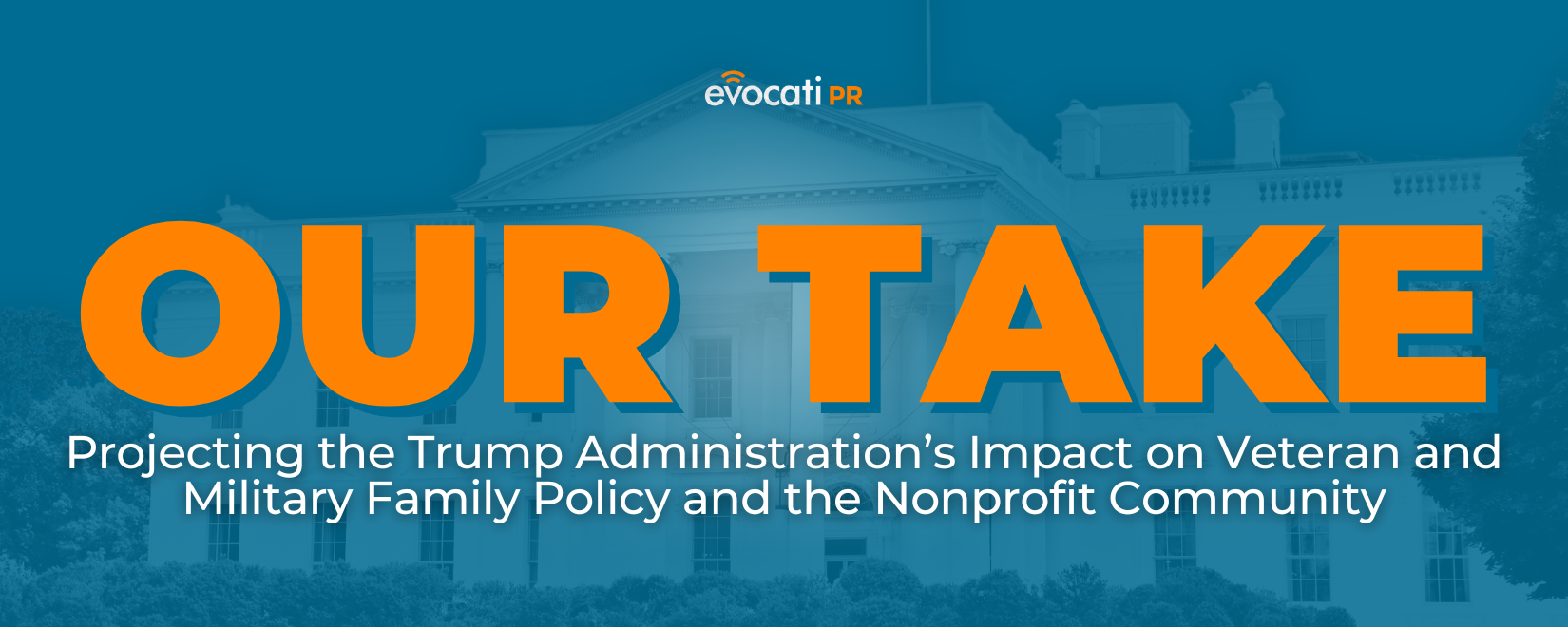Projecting the Trump Administration’s Impact on Veteran and Military Family Policy and the Nonprofit Community
Our Brief for Veteran-Serving Nonprofits & Stakeholders
Introduction
This article seeks to provide a comprehensive analysis of how the incoming Trump Administration is likely to impact veteran and military family policies. This is an abbreviated extract from a confidential brief sent to our clients.
Our intent behind publishing this is to help professional communicators anticipate their PR and marketing needs.
Below we’ll cover anticipated substantive policy changes and their implications for veteran benefits, spouses, and transitioning service members, and forecast donation impacts to veteran-serving nonprofits and Evocati PR stakeholders.
Conservative Policy Priorities
While the influence of the Heritage Foundation's Project 2025 was dismissed by the Trump campaign, and considered by serious political observers as a dog whistle for engaging the Democratic base, it does contain several long-standing conservative principles and policy priorities that could provide a loose blueprint for changes.
Regarding veteran and military family policy priorities, here are several significant changes to the Department of Veterans Affairs (VA) that veteran-serving nonprofits should consider monitoring:
Privatization: Continued calls for increased privatization of veteran healthcare services by outsourcing care to community providers.
Eligibility Criteria: Narrowing the eligibility criteria for health benefits to curtail growth in federal spending. This comes after nearly two decades of conflict in Iraq and Afghanistan and a vast expansion of healthcare programs and services.
Personnel Changes: Replacing some Civil Service employees with political appointees in VA or changing their status to “at-will” employees. Appointees serve at the discretion of the President and are more empowered to enact his agenda.
Disability Claims: Speeding up the review process for disability ratings and placing limits on claims to make future recipients eligible for disability benefits.
Policy Rescissions: Rescinding policies related to abortion services and gender reassignment surgery, arguing that they do not align with service-connected conditions and the Republican Party’s platform.
These proposals have sparked debate with supporters arguing they would streamline and improve VA, while critics warn they could significantly reduce benefits and services for veterans.
Forecasting Leadership Changes at the Top
The U.S. Department of Veterans Affairs official seal outside its headquarters in Washington, D.C. (Source: Evocati PR)
The incoming Trump Administration will appoint a new Secretary of Veterans Affairs (SECVA), potentially someone with a strong military background or previous experience in VA. This could lead to a continuation or expansion of policies initiated during Trump's first term, such as the MISSION Act, which aimed to improve access to healthcare for veterans by expanding services to private providers.
Predicting the Next Secretary of Veterans Affairs
Paul Lawrence: One name under consideration is Mr. Paul Lawrence. Mr. Lawrence is the former Under Secretary of Benefits under President Trump during his first term from 2018 to 2021.
Robert Wilkie: Mr. Wilkie served as SECVA from July 2018 to January 2021. He has a background in both the U.S. Air Force Reserve and U.S. Navy Reserve and held various roles in the Bush Administration and the Pentagon. Mr. Wilkie was also considered a candidate for Secretary of Defense.
Daniel Gade: A retired U.S. Army Lieutenant Colonel, and advocate for disabled veterans, Mr. Gade has served as Commissioner of Virginia's Department of Veterans Services. He is known for his work on veteran policy and his book "Wounding Warriors." Mr. Gade has engaged with EPR receiving informal feedback for promoting his book as well as through his involvement with the Bush Institute’s Stand-To Veteran Leadership Program. He unsuccessfully ran for State Senate in Virginia and had a distant relationship with President-elect Trump.
Peter O'Rourke: A U.S. Navy and U.S. Air Force veteran, Mr. O'Rourke has experience in the defense industry and served as an adviser on veterans issues during President Trump's first transition team. He has also held roles within VA.
This is not an exhaustive nor authoritative list. It’s just as likely President-elect Trump will nominate someone not on this list or never mentioned by media. Given the substantive changes we forecast below, any familiarity or previous experience at VA will be an asset for the President-elect to quickly enact his agenda.
READ MORE: The Trump Cabinet: Who Will Be VA Secretary? | Military.com
(President-elect Trump announced on November 14, 2024, that he will nominate former Congressman Doug Collins, R-Ga, as SECVA. Learn more here.)
Forecasting Impacts to Healthcare and Benefits
Expansion of Healthcare Access to Private Providers: The Administration may push for further expansion of healthcare access for veterans, building on the MISSION or PACT Act, which extended eligibility for VA healthcare to millions of veterans exposed to toxins and expanded care options to private providers. This could include more comprehensive coverage for mental health services and support for veterans with service-related health issues. However this may run counter to their stated desire to slow the rate of federal spending at VA.
Disability Benefits: Changes in the evaluation and compensation for disability claims are very likely, with potential increases or decreases in compensation rates and new presumptive conditions for toxic exposures. This could streamline the process for veterans to receive benefits and address disparities in grant rates for mental health conditions. Careful consideration will be given to the rate of benefit expansion and its impact on the federal budget.
Forecasting Changes for Military Families & VA Employees
Spousal Employment and Education: Policies aimed at improving employment opportunities and educational benefits for military spouses may be introduced. This could include initiatives to reduce barriers to employment and provide more robust support for career development and education.
Transition Assistance: Enhanced support for transitioning service members is expected, with a focus on improving the Transition Assistance Program to better prepare veterans for civilian life. This could involve more personalized career counseling and job placement services.
Civil Service Personnel: The Administration may seek to alter civil service protections, potentially impacting veterans who work in federal government positions. This could involve changes to hiring and dismissal practices, which may affect job security for veterans in these roles. VA is the nation’s largest employer of veterans at nearly 30% of its workforce.
Forecasting Donor Behavior with Veteran Nonprofits
(Source: Unsplash.com)
Public Trust and Support: Veteran nonprofits are among the most trusted charity categories, which bodes well for continued public support. However, the political climate and economic conditions under the Trump Administration could influence donation patterns.
Economic Factors: The Administration's economic policies, including tax cuts and deregulation, may lead to increased disposable income for some donors, potentially boosting charitable contributions. Conversely, economic uncertainty or shifts in federal funding priorities could impact the availability of grants and donations for veteran nonprofits.
Focus on Specific Issues: Increased attention on issues such as mental health, toxic exposure, and support for transitioning service members may drive donations to organizations addressing these needs. Nonprofits that can effectively communicate their impact and align with these priorities are likely to see continued or increased support.
Conclusion
The incoming Trump Administration is poised to implement significant changes in veteran and military family policies. Nonprofits serving this community should prepare for potential shifts in healthcare access, benefits, and support services.
By staying informed and adapting to these changes, organizations can continue to effectively serve veterans and their families while navigating the evolving landscape of public and private support.
Evocati PR stands ready to help its clients and stakeholders navigate shifting landscapes and outlook. If you'd like the same support from a team of experts, contact us today to get started.







